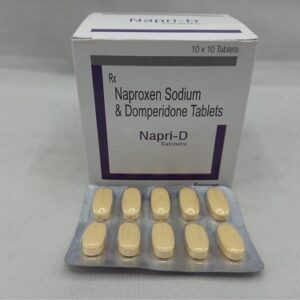Products

AUTINEA-1
₹280.00
Risperidone 1 mg Tablets
Risperidone tablets belong to a class of medications which is known as atypical antipsychotics. They work by helping to restore the balance of certain natural substances in the brain, thereby improving symptoms of psychiatric disorders. Risperidone tablets work by blocking certain dopamine and serotonin receptors in the brain. Dopamine and Serotonin receptors are responsible for regulating mood, emotions, and behaviour. Dopamine receptors are responsible for various functions such as pleasure,, motivation, and reward systems. Serotonin receptors, on the other hand, are involved in regulating mood, anxiety, appetite, and sleep.
This work of risperidone tablets helps to regulate the transmission of nerve signals and reduce the symptoms associated with conditions such as schizophrenia and bipolar disorder. By reducing these neurotransmitters, risperidone tablets can help improve mood, behaviour, and overall mental well-being.
Uses Of Risperidone Tablets
Treatment of Schizophrenia: Risperidone tablets are often prescribed to individuals diagnosed with schizophrenia.
Management of Bipolar Disorder: Risperidone tablets can also be used to treat bipolar disorder. This condition is characterized by episodes of depression and mania, and risperidone can help stabilize mood and prevent extreme mood swings.
Control of Irritability in Autism: Risperidone tablets have been found to be effective in managing irritability and aggression in individuals with autism spectrum disorder.
Relief of Symptoms in Alzheimer’s Disease: Risperidone tablets may be prescribed to individuals with Alzheimer’s disease to help manage symptoms such as aggression, agitation, and hallucinations. However, it is important to weigh the potential benefits against the risks in this population.
Treatment of OCD and Tourette Syndrome: Risperidone tablets have also been used off-label to treat obsessive-compulsive disorder (OCD) and Tourette syndrome..This medication can help reduce compulsions and tics associated with these conditions.
How To Use Risperidone Tablets?
Before starting any medication, including Risperidone Tablets, it is crucial to consult with a healthcare professional. They can provide guidance on dosage, potential side effects, and any drug interactions. Remember to take the prescribed dose of risperidone tablets as directed by your healthcare provider. They’ll start you on a low dose and may increase it gradually as needed. It’s crucial to follow the prescribed dosage and not exceed it without consulting a doctor. Additionally, You can take the tablets with or without food, based on your preference. Risperidone tablets are available in different quantities and are typically taken orally once or twice a day, as prescribed by a healthcare provider.
Expert Advice For Risperidone Tablets
- Make sure to swallow the tablets whole with a full glass of water and avoid crushing or chewing them.
- If you miss a dose, take it as soon as you remember, unless it’s almost time for your next scheduled dose.
- It is important to follow the prescribed dosage instructions for Risperidone Tablets as directed by your healthcare provider.
- Do not increase or decrease the dosage of these tablets without consulting your healthcare professional.
- Alcohol and illicit drugs can interact negatively with Risperidone Tablets, leading to increased side effects or reduced effectiveness of the medication.
- Risperidone Tablets are best taken with food to help prevent stomach upset.
- It is important to stay hydrated while taking Risperidone Tablets, as dehydration can exacerbate certain side effects.
- If you are experiencing any harmful side effects such as difficulty breathing or irregular heartbeat after taking these tablets, inform your doctor.
What Are the Side Effects Of Risperidone Tablets?
Like any medication, risperidone tablets can cause side effects. Common side effects may include drowsiness, dizziness, weight gain, and constipation. In some cases, more serious side effects such as abnormal heart rhythms or seizures may occur. It is essential to report any unusual symptoms to a healthcare provider carefully.
Frequently Asked Questions
What is the use of risperidone tablets?
Risperidone tablets are used for the treatment of bipolar disorder, schizophrenia, or irritability associated with autistic disorder.
Is risperidone used to sleep?
Yes, risperidone tablets are given to sleep in patients with schizophrenia.
Is risperidone used for mood?
Yes, risperidone is effective in enhancing mood.











